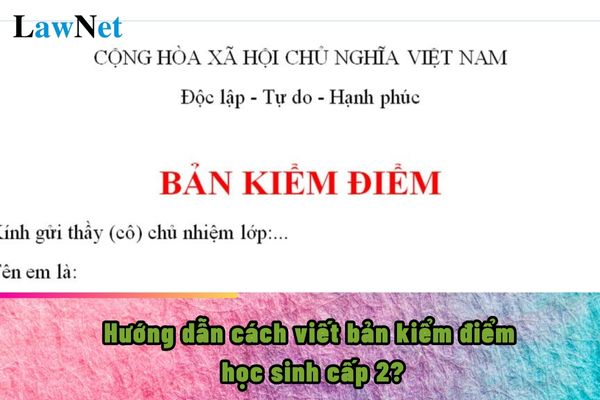Guidelines on writing a disciplinary report for lower secondary school students in Vietnam
Guidelines on writing a disciplinary report for lower secondary school students in Vietnam
A disciplinary report for lower secondary school students is a type of document that a student writes to admit their wrongdoings. This is a form of self-admission and promise to rectify the mistakes, while also showing a sincere attitude towards the teachers, friends, and the school.
Common content in a disciplinary report for lower secondary school students in Vietnam:
Title: Disciplinary Report
Full Name: Full name of the student.
Class: Current class.
Violation Details: Describe in detail the wrongful behavior committed.
Time and Place of Violation: Specify the time and place of the incident.
Reason for Violation: Analyze the reasons leading to the wrongful behavior.
Consequences: Specify the negative impacts caused by the violation.
Lessons Learned: The lessons learned from the experience.
Promise to Rectify: Commitment not to repeat the mistake and specific actions to remedy the consequences.
Date: The date the form is written.
Student's Signature: Sign to confirm the content of the form.
Guidelines on writing a disciplinary report for lower secondary school students in Vietnam in 2024
- Name, date of birth, place of residence, position of the person writing the disciplinary report.
- Content of the disciplinary report, clearly stating the violation, reasons, and consequences of the violation.
- Promise to correct mistakes and remedy the consequences.
- Sign and clearly state the full name of the person writing the disciplinary report.
The simple guideline for writing a disciplinary report for lower secondary school students for various situations is as follows:
[1] To: Clearly state the recipient of the disciplinary report form. For example: Mr. (Ms.) Homeroom Teacher Nguyen Van A... or the School Board of Directors....
[2] Information of the student writing the disciplinary report. For example:
I am Nguyen Van A... a student of class 9B.
[3] Reason for writing the disciplinary report:
For example: Late to school on .... Reason: due to bus breakdown on the way.
Talking during class or skipping class on .... Reason: due to peer influence and persuasion.
[4] Commitment: Express a sincere attitude and awareness to correct mistakes. The student should also propose measures to remedy the consequences of their actions.
For example: I promise not to repeat the mistake and will be on time for school, avoiding late arrivals, and will strive to study, not being influenced by friends. If I repeat the mistake, I accept any disciplinary action from the school.
[5] Student's Signature.
Download the disciplinary report for lower secondary school students
*Note: Information is for reference only./.
What are regulations on the periodic evaluation of lower secondary school students in Vietnam?
According to Clause 1, Article 7 of Circular 22/2021/TT-BGDDT, the periodic evaluation of lower secondary school students is as follows:
- Periodic evaluations (not applied to thematic clusters of study), including mid-term and end-term evaluations, are conducted through: tests (on paper or on computer), practical exercises, learning projects.
- The duration for the tests (on paper or on computer) for subjects (excluding thematic clusters of study) with up to 70 periods/year is 45 minutes; for subjects (excluding thematic clusters of study) with more than 70 periods/year, it is from 60 to 90 minutes; for specialized subjects, up to 120 minutes.
- For tests (on paper or on computer) evaluated by score, the test is constructed based on a matrix, a specification of the test, meeting the requirements of the subject as stipulated in the General Education Program.
- For tests (on paper or on computer) evaluated by comments, practical exercises, learning projects, there must be guidelines and assessment criteria based on the requirements of the subject as stipulated in the General Education Program before implementation.
- Each term, each subject evaluated by comments has once a mid-term evaluation and once an end-term evaluation.

Guidelines on writing a disciplinary report for lower secondary school students in Vietnam (Image from the Internet)
What are responsibilities of subject teachers in periodic evaluation of lower secondary school students in Vietnam?
According to Clause 1, Article 19 of Circular 22/2021/TT-BGDDT, the responsibilities of subject teachers are as follows:
- Conduct regular evaluations; participate in periodic evaluations as assigned by the Principal; directly record or enter scores, evaluation levels in the Student Monitoring and Evaluation Book (by class), the Student Monitoring and Evaluation Book (of the teacher).
- Calculate the average score for the subject (for subjects combining evaluation by comments and scores); summarize the evaluation level (for subjects evaluated by comments) by term, throughout the school year; directly record or enter scores, evaluation levels in the Student Monitoring and Evaluation Book (by class), the Student Monitoring and Evaluation Book (of the teacher), and the student's School Record.
- Provide comment information on the students' training results as stipulated in Point b, Clause 1, Article 8 of Circular 22/2021/TT-BGDDT to the homeroom teacher.
What behaviors are lower secondary school students in Vietnam prohibited from doing?
Based on the regulations in Article 37 of the regulations issued together with Circular 32/2020/TT-BGDDT, the behaviors prohibited for lower secondary school students are as follows:
Prohibited behaviors of students
- Insulting the dignity and honor, violating the body of teachers, school staff, others, and other students.
- Cheating in studying, tests, exams, and admissions.
- Buying, selling, or using alcohol, beer, tobacco, drugs, other stimulants, fireworks, and explosive materials.
- Using mobile phones or other devices during class time that do not serve the learning purpose and are not approved by the teacher.
- Fighting, causing disturbance in the school and public places.
- Using or exchanging cultural products with violent, obscene content; using toys or playing games that are harmful to one's healthy development.
- Students are prohibited from engaging in other prohibited behaviors as stipulated by law.

